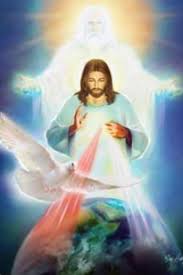TRINITY SUNDAY Year B
Make Disciples of All Nations
(Deuteronomy 4:32-34, 39-40; Romans 8:14-17; Matthew 28:16-20)
************************************************************
 A teacher was trying to teach her class the creed by having assigned students recite the different parts at the start of each class. It worked well for a few days, then one day there was silence when it came to the last part. One of the students piped up, “Teacher, the student who believes in the Holy Spirit isn’t here!”
A teacher was trying to teach her class the creed by having assigned students recite the different parts at the start of each class. It worked well for a few days, then one day there was silence when it came to the last part. One of the students piped up, “Teacher, the student who believes in the Holy Spirit isn’t here!”
What is your main purpose in life? What is your driving force? What about going to make disciples of all nations?
Today, Trinity Sunday, different commentaries on the gospel, especially the New Interpreters Bible, provide us with a rich catechesis on our Trinitarian faith and a mission for our lives.
First of all, we learn more about our Trinitarian God. Jesus, the Redeemer, begotten by God the Father, sets humanity back on the path of truth and blessing, taking on the sins of humanity and inviting a new intimacy with God. The Advocate, the Holy Spirit, lives in our midst, leads us away from sin, helps us to recognize our adoption as children of God, lends us strength when we falter, and guides us to the source of spiritual energy and joy. The one eternal God is fully revealed as the Trinity: Creator, Redeemer and Advocate
I like to think of God as family, as intimate relationship. One day while visiting friends, Junior and Shelly, their 15-year-old daughter returned from a soccer tournament. She burst into the house, went straight to her dad, sat on his lap, flung her arm around his neck, leaned her head against his, and just lay there, content, soaking up his love. I was transfixed, deeply moved, caught up in this moment of deep intimacy between a father and his daughter. Shelly and the kids didn’t even notice – this was normal around their house.
As I left that home, it struck me I had just had an experience of God – of God as family, relationship, intimacy. Junior and Shelly had made a marriage commitment: their love for each other produced their children, and all three parts, father, mother and kids, were living in harmony, unity, intimacy, oneness, acceptance, relationship. And to me, that images God, Father, Son and Holy Spirit. The Spirit is the bond of love between the Father and the Son. All three persons live in harmony, unity, intimacy, oneness, acceptance and relationship for all eternity – so God is family.
In these readings we are also given an ecclesiology or theology of Church. The resurrection was neither a mere restoration of life nor a mere vindication of the Messiah, but the beginning of a new existence in which the life of the Messiah becomes the enduring life of that group which continues his mission. The Church itself is a prime witness of the resurrection, as its life and activity are a constant testimonial that Jesus lives.
The Church does not exist for itself, but for its mission. After the pivotal point of human history, his death-resurrection, Jesus returns to found his church. He now sends the eleven to all nations, not just the Jews; with baptism, not circumcision as the initiation rite, and with His commands, not the Mosaic law, as final norm of morality. This is a very creative text coming uniquely from Matthew.
What all, believers and unbelievers alike, will see at the end of time, the believing church sees and experiences from the death-resurrection onwards: the exaltation and the coming of the Son of Man in his prophecy and glory. The church alone experiences this anticipated coming in the present moment, for the church is the only place where the kingdom of God is not only an objective reality but also a subjective experience, the place where the Son of Man not only rules but also is acknowledged, obeyed and praised.
Lastly, we are given a theology of baptism. The underlying reality of baptism is that it attaches a person to Jesus the Savior, whose work of salvation proceeds from the Father’s love and reaches its completion in the outpouring of the Holy Spirit. Baptism “into the name” signifies the person baptized belongs to the Trinity of persons whose names are invoked in baptism. “Command” signifies a new way of life, just as Moses’ “Law” gave a new way of life.
Baptism is not into one divine person or an impersonal divine force. One is immersed into the bonds of family love which bind together the Father, Son and Spirit, and all members of the Church as family of God. Baptism is thus joining the life of the Trinity, and the Church. Baptism marks a transition from outside the Christian community to discipleship within it.
The Eucharist is our daily or weekly mountain top experience of Jesus and his love that transforms us into disciples, into a faith family striving for unity. It is the family meal of the baptized and food for our journey into God as God’s family.
So, make this commandment of Jesus your life’s priority – Go and make disciples of all nations.



